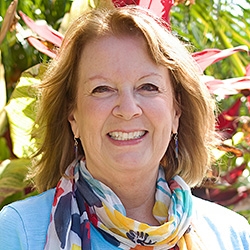
Search Results: inequality
-
In a workshop, a hesitant white neurodivergent man faced a triggering reaction from a Global Majority transgender man. Uncovering their backgrounds, the facilitator addressed family dynamics and exclusion. A repair exercise fostered empathy, challenging assumptions and emphasizing the importance of equitable facilitation for a richer group experience.
-
Instead of allocating resources based on needs, we cling to having more money or privilege than others because its close enough substitute for our deeper longing. We may cling to narratives that seem to legitimize this inequality as something we deserved -- such as earning it; having more talent or ability; or needing more for company growth. This soothes our discomfort of having more than others. But these narratives still block us from genuinely getting in touch with the needs of life.
-
-
-
The existing unequal risks and impacts people of certain race, class and identities face in society is magnified in these strenuous times -- especially with things such as illness, financial well being, discrimination, attacks, and death. As responsive NVC practitioners we can stand in solidarity with those who are differentially impacted. Read on for this, and additional ways to spot common pitfalls of doing so.
-
-
We can't alone (nor with lone communities) transform the hidden structures of violence and domination. Dialogue alone isn't disruptive enough. We can easily be in dialogue with Trump supporters while the planet burns up, millions are still hungry, and we go extinct. NVC seriously risks reinforcing vast inequities and abuses if we're not radically engaging systemic constraints, and impacts of our choices that go beyond our immediate circle. Read on for ways to leverage NVC practices to expand true social change.
-
In learning how to re-invent the economic system so that it distributes resources in a way that includes as many people's needs as possible, we would need to be in a process of mutual influence with one another. However, addressing resource distribution can be complex when people in different social locations have 1.)a different sense of what's considered "enough" 2.) different capacities to find creative strategies that work within the given limitations, and 3.)different levels of self-doubt, shame and capacity to put their concerns and needs on the table. Can we collectively create conditions that support people to stretch productively so that included in the outcome are the needs, perspectives, ideas, and concerns of people who are less powerful? What needs to be in place to support the way towards a better future?
-
Our world trains us to think in terms of providing for everyone’s needs because they deserve it, earned it, or they possess the resources -- it's fair, socially just, supports equality or because people have rights. Instead, can we step outside this worldview to look at providing for everyone’s needs because those needs exist -- can we hold this basic reverence for life? Are we able to have a needs-based dialogue when such a reframe could alienate those who live in the worldview of earn/deserve?
-
"All humans share the same needs" -- tragically, this idea can hide the reality that some people with less power in society have needs that go unmet to a greater extent, much longer, and with more dire consequences. Often, when the marginalized bring up experiences related to their membership in a certain group, their pain isn't acknowledged, and focus shifts to the listener's discomfort. The concept of universal human needs can be used to silence and minimize their pain. Read on for how to proceed.
-
Even in the pandemic the line between what’s essential for people and what is “essential” for fueling the economy, often gets confused. Capitalist market economies actively undermine attending to needs for the many and for life as a whole. Economic recovery is a mirage leading to continued collective oppression. This article explores possible ways to bring us closer to attending to our actual needs — and caring for self, others and life.
-
The pandemic has unsettled deep patterns of consumption. There’s a fear, and with it comes the mindset that is the heart of rampant consumption; habits which are essential to the market economy’s “economic recovery”. High consumption is also the most direct cause of environmental degradation. What do we need in order to significantly reduce consumption for our greater resilience and freedom, and to increase our planetary and human sustainability?
-
If we're to have a better future, our biggest task will be to reexamine what the police are, their place in the system, and more. Police violence exists by systemic design. The myths of where the problems and symptoms lie with the police, capitalism, laws, government, citizens, class and racism --plus the relationship between all these-- is what keeps oppression ongoing on a mass scale. For change to happen, we'll need to find systemic leverage points, and use privilege to benefit those without it. Read on for more.
-
“Nonviolence” is not just a political tactic. It is a “soul force,” a courageous and compassionate stand in the face of what seems to us unjustly unequal, oppressive, and violent. It is the force of love meeting and transforming what appears to not be love.. It is the force of love meeting and transforming what appears to not be love. It is speaking and listening with courage, compassion, and an open heart and mind and rooted in our truth in a way that bridges understanding. And doing so without demand nor trying to convince -- all in the face of any anger, fear, oppression, inequality, violence or disagreement.
-
Trainer Tip: "Power over" refers to using power, coercion, fear or authority to force change. It rarely brings lasting change. "Power with" refers to power that seeks to meet everyone’s needs. A "power with" system values input and needs of everyone who will be affected by decisions. When you notice you're using a power over paradigm to get results, shift focus to power with. Notice how this shift in consciousness affects results.
-
How much money to pay? And how much money to ask for? The supply and demand logic basically say that we ask for the most that “the market can absorb” and pay “the least that we can get away with.” We can instead, we can engage in experiments that focus on connecting to and satisfying needs. We can also engage with our varying degrees of access to resources within the existing economy and consider how we want to make choices about resources, especially when we have access to power.
-
We can create processes that encourage resources (particularly money) to flow to where they are most needed. Engaging in "money piles" is one new way that can refocus conversations on real, practical problems to solve -- rather than ideological or abstract discussions about who "earned", "deserved", worked "harder", or merits more. It can tilt conversations based on transaction and obligation towards care and relationship. Read on for three examples that further illustrate how this new way of operating may even bring us closer to the type of world we all want to live in.
-
Our ability to reduce our reliance on money, or even exit the logic of money and exchange in our own thinking, is limited by the degree of trust we have that our needs will be met without it. The more we can enter into sufficient trust, the more we can enter into a web of sharing resources -- borne from a place of love. Read on for more.
-
"Privilege" has many meanings, which can bring confusion. Here are questions essential to navigating challenges in NVC community about "privilege": How to call attention to times when language is used to divide and not connect? Where are people coming from when they say "privilege"? How to focus on using whatever language supports the depth of connection we seek with the heart of the people in front of us? Read on for more.
-
In treating everyone the same, we perpetuate inequities. If we want NVC consciousness to spread globally, it's crucial to acknowledge how various demographics are have varying capacities, and are differentially perceived, treated and impacted. Modifying our NVC teachings can increase equity and reduce the frequent judgement, disbelief, denial, insistence, non-resonance and re-marginalization that so many experience in NVC circles.











